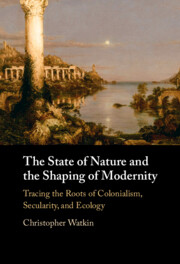Refine search
Actions for selected content:
502 results
The mental hygiene movement: the birth of global mental health in India
-
- Journal:
- Medical History , First View
- Published online by Cambridge University Press:
- 05 December 2025, pp. 1-19
-
- Article
-
- You have access
- Open access
- HTML
- Export citation
18 - British Fiction, Decolonization, and the Cold War
- from Part IV - Pathways and Legacies: 1945–2020
-
-
- Book:
- The Cambridge Companion to British Literature and Empire
- Published online:
- 20 November 2025
- Print publication:
- 04 December 2025, pp 259-278
-
- Chapter
- Export citation
1 - Early Modern Utopia
- from Part I - Early Intimations and Literary Genres: 1500–1800
-
-
- Book:
- The Cambridge Companion to British Literature and Empire
- Published online:
- 20 November 2025
- Print publication:
- 04 December 2025, pp 19-35
-
- Chapter
- Export citation
Analysing recognition multidirectionally: Canada, United Nations membership, and the Algerian question
-
- Journal:
- Review of International Studies , First View
- Published online by Cambridge University Press:
- 25 November 2025, pp. 1-30
-
- Article
-
- You have access
- Open access
- HTML
- Export citation
“Where have the sand turtles gone?”: A Waimānalo orientation to plastics research
-
- Journal:
- Cambridge Prisms: Plastics / Volume 3 / 2025
- Published online by Cambridge University Press:
- 21 November 2025, e41
-
- Article
-
- You have access
- Open access
- HTML
- Export citation
4 - Black Marxists and the Character of an African Leninist Economy
- from Part II - Socialist Dreams
-
- Book:
- Socialist De-Colony
- Published online:
- 10 November 2025
- Print publication:
- 20 November 2025, pp 165-200
-
- Chapter
-
- You have access
- Open access
- HTML
- Export citation
Conclusion
-
- Book:
- Socialist De-Colony
- Published online:
- 10 November 2025
- Print publication:
- 20 November 2025, pp 266-288
-
- Chapter
-
- You have access
- Open access
- HTML
- Export citation
2 - Ghost Projects
- from Part I - Ghana–Soviet Entanglements
-
- Book:
- Socialist De-Colony
- Published online:
- 10 November 2025
- Print publication:
- 20 November 2025, pp 80-117
-
- Chapter
-
- You have access
- Open access
- HTML
- Export citation
Chapter 10 - Poststructuralism
- from Part II - Theoretical Turn
-
-
- Book:
- African Literature in Transition
- Published online:
- 07 November 2025
- Print publication:
- 20 November 2025, pp 189-202
-
- Chapter
- Export citation
6 - Utopias, Dystopias, Labor, and Socialist “Contradictions”
- from Part II - Socialist Dreams
-
- Book:
- Socialist De-Colony
- Published online:
- 10 November 2025
- Print publication:
- 20 November 2025, pp 236-265
-
- Chapter
-
- You have access
- Open access
- HTML
- Export citation
14 - Crises and Coexistence, 1953–1963
-
- Book:
- Distant Friends and Intimate Enemies
- Published online:
- 30 October 2025
- Print publication:
- 20 November 2025, pp 283-311
-
- Chapter
- Export citation
1 - “Highlife Solidarity”
- from Part I - Ghana–Soviet Entanglements
-
- Book:
- Socialist De-Colony
- Published online:
- 10 November 2025
- Print publication:
- 20 November 2025, pp 29-79
-
- Chapter
-
- You have access
- Open access
- HTML
- Export citation
15 - Mandates, Trusteeship, and Decolonization in the North Pacific: Balancing Self-Determination, Development, and Security
- from Part IV - The High Cold War in Asia
-
-
- Book:
- East Asia and the Modern International Order
- Published online:
- 25 November 2025
- Print publication:
- 20 November 2025, pp 278-296
-
- Chapter
- Export citation
5 - Socialism Reconsidered
- from Part II - Socialist Dreams
-
- Book:
- Socialist De-Colony
- Published online:
- 10 November 2025
- Print publication:
- 20 November 2025, pp 201-235
-
- Chapter
-
- You have access
- Open access
- HTML
- Export citation
Chapter 1 - Unfinished Communities
- from Part I - Decolonization Currents
-
-
- Book:
- African Literature in Transition
- Published online:
- 07 November 2025
- Print publication:
- 20 November 2025, pp 23-47
-
- Chapter
- Export citation

The State of Nature and the Shaping of Modernity
- Tracing the Roots of Colonialism, Secularity, and Ecology
-
- Published online:
- 19 November 2025
- Print publication:
- 18 December 2025
Epilogue
- from Part II - The Coal Regime during the Boom Years and an Environment at Stake
-
- Book:
- Vietnam's Coal Frontier
- Published online:
- 25 October 2025
- Print publication:
- 13 November 2025, pp 285-298
-
- Chapter
- Export citation

Socialist De-Colony
- Black and Soviet Entanglements in Ghana's Cold War
-
- Published online:
- 10 November 2025
- Print publication:
- 20 November 2025
-
- Book
-
- You have access
- Open access
- Export citation
Why is Ku Hung-Ming peripheralized in the Chinese historiography of translation? The politics of translation historiography
-
- Journal:
- International Journal of Asian Studies , First View
- Published online by Cambridge University Press:
- 03 November 2025, pp. 1-14
-
- Article
-
- You have access
- Open access
- HTML
- Export citation
10 - Irregular War and Warfare
- from Part II - The Traditional Security Agenda
-
- Book:
- Understanding International Security
- Published online:
- 11 October 2025
- Print publication:
- 30 October 2025, pp 191-209
-
- Chapter
- Export citation
